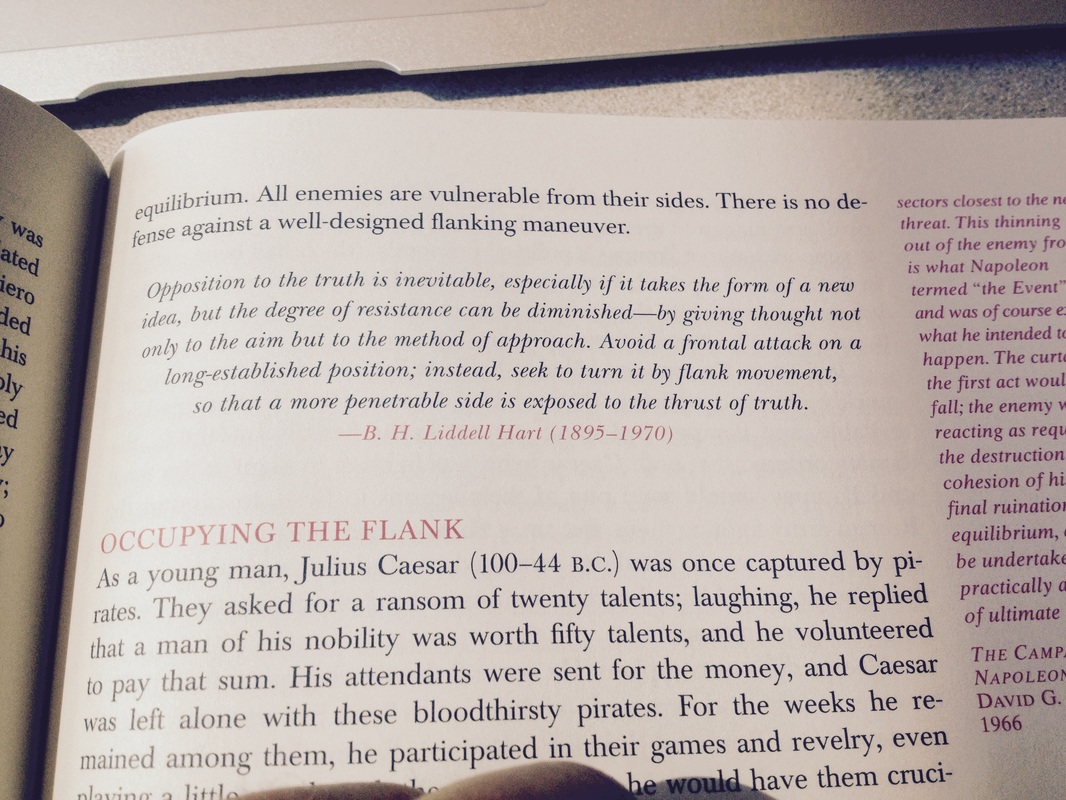In The 33 Strategies of War, Robert Greene returns to dozens of history's battlefields with the sole mission of extracting winning strategies — ones that can be applied to all areas of life. "War, Greene writes in the preface, "is not some separate realm divorced from the rest of society. It is an eminently human arena, full of the best and worst of our nature."
The battlefields Greene takes us back to are as diverse as could be; from a besieged ancient Athens to envy-laced Hollywood studios, from Roosevelt's Depression-era campaign trail to the dark Vietnamese jungles. We may not be leading a ragtag army outnumbered 20 to 1, suffering from malnutrition with disrupted supply lines. Or surrounded by a network of spies, saboteurs and assassins plotting our downfall. Or gifted with a genius-level of focus and foresight and charisma to ask the impossible of a nation. But the principles for success in any area of human endeavors, Greene contends, are as timeless as they are adoptable.
The battlefields Greene takes us back to are as diverse as could be; from a besieged ancient Athens to envy-laced Hollywood studios, from Roosevelt's Depression-era campaign trail to the dark Vietnamese jungles. We may not be leading a ragtag army outnumbered 20 to 1, suffering from malnutrition with disrupted supply lines. Or surrounded by a network of spies, saboteurs and assassins plotting our downfall. Or gifted with a genius-level of focus and foresight and charisma to ask the impossible of a nation. But the principles for success in any area of human endeavors, Greene contends, are as timeless as they are adoptable.
A word of warning from the author though:
"The world is full of people looking for a secret formula for success and power. They do not want to think on their own; they just want a recipe to follow. They are attracted to the idea of strategy as a series of steps to be followed toward a goal. They want these steps spelled out for them by an expert or a guru. Believing in the power of imitation, they want to know exactly what some great person has done before. Their maneuvers in life are as mechanical as their thinking...the essence of strategy is not to carry out a brilliant plan that proceeds in steps; it is to put yourself in situations where you have more options than the enemy does."
Enemies, adversaries, opponents, competitors — they come into our lives in various ways: passive-aggressive co-workers with hidden agendas and vendettas, business competitors in your own industry smearing your work or poaching your resources and talent pools, shoestring marketing budgets, bike crashes...there's no shortage of obstacles to maneuver around to reach your goals.
As Greene recommends in his other great works Mastery (read my rec here) and The 48 Laws of Power (read my rec here), take his advice as a starting point to test in the field and adapt to your own situations and interests. {JG}
* * *
Like in The 48 Laws of Power, each Law is structured in the following way:
1. Statement of the Law
2. Summary of historical event(s) that dramatize the Law in action
3. An instructive interpretation section
4. An additional section on further application of the Law
5. An "Image" of the Law (water, fire, a noose, a bull) to visualize the theme
6. An example of the Law's Reversal (sometimes the opposite works too)
7. Supplementary quotes stressing the same idea (in margins)
"[Strategy]...is the application of knowledge to practical life, the development of thought capable of modifying the original guiding idea in the light of ever-changing situation; it is the art of acting under the pressure of the most difficult conditions."
— Helmuth von Moltke
1. Statement of the Law
2. Summary of historical event(s) that dramatize the Law in action
3. An instructive interpretation section
4. An additional section on further application of the Law
5. An "Image" of the Law (water, fire, a noose, a bull) to visualize the theme
6. An example of the Law's Reversal (sometimes the opposite works too)
7. Supplementary quotes stressing the same idea (in margins)
"[Strategy]...is the application of knowledge to practical life, the development of thought capable of modifying the original guiding idea in the light of ever-changing situation; it is the art of acting under the pressure of the most difficult conditions."
— Helmuth von Moltke





















